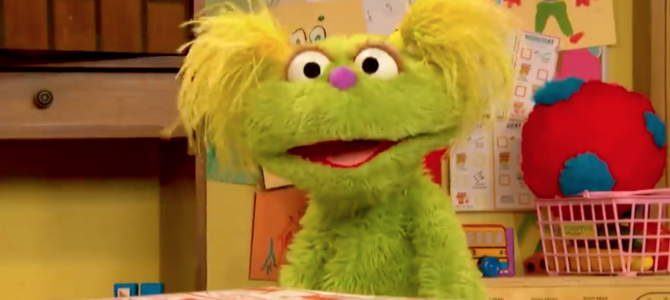
“Sesame Street” recently went from announcing a move to HBO Max to announcing one of its puppets will struggle with addiction, all in a week’s time. These developments may seem unrelated, but they actually make for an unfortunate juxtaposition.
Since 2015, “Sesame Street” episodes have aired on PBS nine months after debuting on HBO. The same will be true when the show jumps to HBO Max in 2020, but first-run episodes will premiere on the digital platform, not traditional HBO. Changes in the media landscape are ultimately what necessitated “Sesame Street’s” transition to premium cable. (Taxpayer money reportedly only accounts for 4 percent of the show’s annual budget.)
Access to HBO Max is set to cost at least as much as HBO Now, which is $14.99 per month. HBO Max obtained the rights to “Sesame Street’s” catalog in the deal, and plans to develop four new shows in the universe along with annual specials—presumably all behind the paywall.
One week after “Sesame Street” announced the move to HBO Max, it announced Karli, a friend of Elmo’s, would struggle with her mother’s opioid addiction in a series of online videos. “There’s nothing else out there that addresses substance abuse for young, young kids from their perspective,” a senior content manager at Sesame Workshop told The Guardian. Thankfully, the relevant segments are available free online through the Sesame Street in Communities website.
Given addiction’s impact on low-income communities (consider the opioid crisis’ particular intensity in poor counties), it’s good news that Karli’s story won’t be locked behind a paywall for nine months. That said, the topical plot line is a reminder that “Sesame Street” strives to be—and is—an important resource for many families across socioeconomic lines, especially on timely issues. In that sense, a nine-month penalty for those who lack the resources to purchase HBO Max seems counterproductive.
As Jessica Winter noted back in 2015, “Sesame Street was founded to help low-income kids keep up with their more affluent peers.” Controversial as it was, the show’s move to HBO allowed for the production of more content and kept it on air.
Children and families are not entitled to “Sesame Street.” Elmo is not a human right. But, as critics argued four years ago, there’s something odd about a program developed specifically to boost low-income children keeping its content locked up for nine months, available only to kids whose parents can afford premium streaming.
Of course, that set-up is what keeps “Sesame Street” alive. And the show seems to be finding a way to ensure a substantial chunk of its content remains free. But the PBS-HBO alliance has some on the right and left aligned in their concern for low-income children.
I thought Tim Winter of the Parents Television Council made a good point in his statement on the decision, arguing HBO “obviously” knows first-run episodes are valuable, which implies the network is withholding a valuable product from underprivileged kids. Winter also observed that purchasing HBO Max involves purchasing access to racy programming like “Euphoria,” which families may not want to bring into their homes or perpetuate with their financial backing.
Sadly, HBO is holding hostage underprivileged families from having access to timely first-run episodes of perhaps the single most educational children’s franchise in the history of electronic media. HBO is building their new streaming platform on the backs of the most vulnerable children – those who are economically disadvantaged and who most urgently need the kind of programming Sesame Street provides. HBO obviously thinks that having exclusive first-run access to Sesame Street is of considerable value, otherwise, why would they tout it? It’s outrageous that families who want to bring first-run episodes of Sesame Street into their home, either via the premium cable network or a streaming service, will also be forced to pay for and invite into their homes content like the extremely graphic teen-targeted show, Euphoria. Families should be extremely concerned about this move.
Others reacted similarly to the socioeconomic disparity, and not just from the right.
https://twitter.com/rgay/status/1180145304068182018?s=20
I grew up in a trailer park with Sesame Street. My family was never able to afford HBO when I was growing up. I'm so sad for all the kids who will grow up without the show. https://t.co/GI4nVXrYM4
— Dominick Evans (@dominickevans) October 3, 2019
Sesame Street democratized educational entertainment across all classes and cultures. As long as you had access to a television, it was a free public utility, for everyone. Restricting it to well-off families who can afford HBO subscriptions is a tragedy. https://t.co/GUZDJKHgLs
— Rob Sheridan, For The Holidays® (@rob_sheridan) October 5, 2019
https://twitter.com/samfbiddle/status/1179865840985858048?s=20
This is completely antithetical to the mission of children’s educational television. Kids who are most in need will be unable to access it. Very disappointing move by Sesame Workshop https://t.co/Fh3cEltpkK
— Joe Hanson (@DrJoeHanson) October 4, 2019
Is the cost of keeping “Sesame Street” episodes behind a paywall for nine months worth the benefit of keeping the show on the air? Probably, although the disparity is difficult to stomach. A better question might ask whether that cost is a necessary one, or whether its impact on low-income families has been mitigated to the greatest extent possible.
Perhaps this is indeed the best-case scenario. Good luck explaining that to struggling parents, many of whom already are probably receptive to populist messages, and understandably so. Whatever is actually best for the show and its viewers, “Sesame Street” somehow got caught in the crossfire of class warfare—and people across the ideological divide aren’t exactly pleased to see it there.









